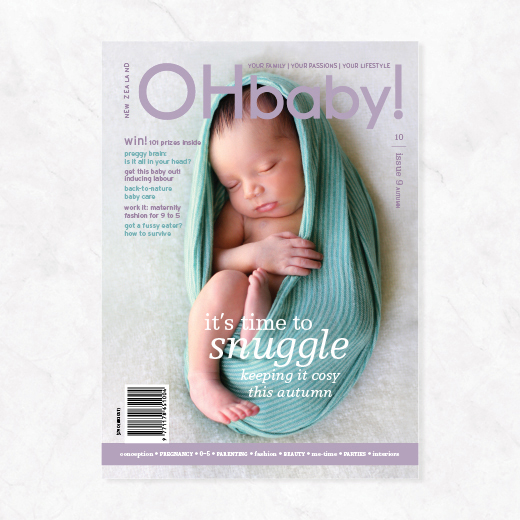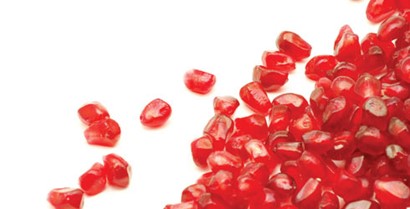Natural babycare

New mums are becoming increasingly concerned about what products and treatments they're administering to their newborns. Lots of products say 'natural' on the label, but how can you really know you're choosing something safe? Su-lin Sze explains.
Natural personal-care products are flourishing right now, a reflection of our growing passion for health and well-being, and not just for our own health, but the health of our planet too. The trend toward natural and organic products is increasingly popular due to their efficacy and purity, as well as concerns about harmful environmental toxins in synthetic products. In fact, according to the 2007 UK-based Organic Monitor, the natural and organic skin care industry will grow in coming years by as much as 9%, compared to 1% growth predicted for conventional personal products.
There are many advantages in choosing to use natural and non-synthetic baby-care products, such as:
- Improved health of earth for future generations (your children!).
- Healthier oceans, rivers, and soils thanks to reduced pollution.
- Healthier children. Studies have shown that the organic and natural lifestyle reduces the incidences of skin conditions (such as eczema) and allergies in children.
- Ensuring the longevity of eco-aware manufacturers, who also support the recyclable packaging industries and employ sustainable farming techniques.
According to market research, skin conditions in babies are on the rise because of increasing exposure to irritants. The main irritant chemicals found in conventional baby care products include synthetic preservatives (often paraben-based), synthetic fragrances, synthetic dyes, and mineral oil. These can all be replaced safely with natural, hypoallergenic alternatives such as certain essential oils, natural base oils like grapeseed or sweet almond oil, and natural colours from flowers and plants like calendula and carrot.
The good news for parents is that there is a growing appreciation of the sensitivity and vulnerability of babies' skin. Natural baby care products are rich in powerful plant extracts and vital nutrients that stimulate innate healing abilities, helping babies to grow and develop without causing uncomfortable side effects. The herbs calendula and chamomile, for example, are now well-known throughout the world as gentle healers for babies with skin irritation, inflammation, and pain. It's exciting to see parents embracing a natural revolution in personal care, and discovering the world of plants along the way. After all, these are the original medicines. Some herbs such as fennel, an anti-colic herb, were used by breastfeeding mothers as far back as ancient Greece.
The path to awareness
Biodynamic farming is a step beyond organic farming, and it was born out of a desire to optimise the health of all living beings, including planet Earth. Biodynamic products have a high strength and vitality, which sets them apart from conventional products. The beauty of this approach to agriculture is its commitment to sustainable farming techniques that help the Earth, while delivering deeply nutritious, pure raw materials for human usage. Biodynamic farming was created by Rudolf Steiner (1861-1925), who also developed anthroposophic medicine.
Steiner believed in a connection between the quality of food we eat and the strength of our thinking. Eating high-quality food helps to keep the body alert and vital by improving immunity and lowering allergic tendencies. According to Phillip Melville of Weleda New Zealand, "Rudolf Steiner thought that the surface of the earth is like our gut - it is the digestive organ of the earth, with the microbes and insects breaking down substances leaving them available for plant and other life. So I think what we are doing with biodynamics is very similar to keeping a healthy digestive tract - arguably the most fundamental parameter of good health."
Buying natural
So how do you know you're choosing natural? Follow these simple shopping tips:
1. Check product labels and avoid buying anything containing unpronounceable synthetic compounds or toxic chemicals.
2. Support skincare brands that invest in biodynamic techniques, fair trade practices, and eco-certified farming.
3. Multi-purpose products such as an all-in-one body wash and shampoo will save you money, so you can afford to purchase a purer, more premium-quality product.
4. Look for certification seals on your personal care products, such as NaTrue and the BDIH seal for certified natural cosmetics. These indicate that toxins, artificial ingredients, and harmful additives have not been used. If you're a biodynamics fan, look for the Demeter certification that ensures standards in this farming practice have been adhered to.
5. Check the ingredients list on the actual product rather than the front label. Often a product can contain organically grown herbs or fruits, but it still contains synthetic preservatives.
Natural treatments for common baby complaints
Teething, nappy rash, colic and constipation can be quite distressing for babies and parents, so here is some useful information to help you relieve your baby's pain or discomfort.
Teething begins for most babies between the ages of six and eight months. Look out for swollen gums, extra drooling and dribbling, rashes on the chin, cheeks or nappy area, disturbed sleep, and increased crying. They will want to chew on something firm and cool to numb the gums and reduce pain, so have items ready to provide your baby with instant relief, such as a cooled apple wedge or frozen facecloth.
Homeopathic medicines are a safe and natural treatment for teething, such as a teething powder containing chamomilla root for its pain reducing actions on the teeth, and also Conchae, to soothe aches and pains. Add a small amount of the powder to warm water, insert into your baby's mouth, and the healing ingredients will gently diffuse into the gums and surrounding tissues to soothe pain and irritation.
Other symptoms of teething can occur from increased saliva production and acidity of stools. Skin irritation on the chin and cheeks, and nappy rash, can be soothed with natural skin products based on anti-inflammatory herbs such as calendula, chamomile, and aloe vera. Calendula, treasured for centuries as a calming skin softener, is a gentle and reliable herb suitable for use with most babies. Look for calendula oils, lotions, nappy change creams and bathing products to provide both a nourishing and cleansing experience for your baby.
Many babies also develop nappy rash while teething due to the increased acidity of their stools. Be sure to act quickly, as nappy rash can progress into raw blisters and ulcers and is extremely uncomfortable. Keep the area as clean and dry as possible, and use a designated Rash Relief cream daily. Choose one with therapeutic herbal ingredients such as Calendula, Chamomile, St Johns Wort (Hypericum) and Nettle. These will give relief from itching and pain and begin the process of healing. Avoid talcum powders and any creams with synthetic ingredients such as perfumes and preservatives as they will further irritate. Also ensure your baby wears breathable clothing by avoiding synthetic materials.
Baby colic is a distressing condition in which spasmodic abdominal pains cause babies to become impatient and irritable. A build up of gas in the digestive tract is the cause, and there are natural ways to relieve the discomfort for babies, reducing crying time, improving sleep and softening the belly.
Breastfeeding mothers can do two things immediately to relieve colic in their babies. Firstly, avoid eating any common colic-triggers such as dairy products, soy, wheat, eggs, peanuts, fish, artifical preservatives, additives, and colourings. Secondly, drink a nursing tea with classic lactation-supporting herbs like Fennel, Caraway, Anise and Lemon Verbena. These herbs are classifed as Carminatives, which means they relieve spasm in the digestive system and help to dispel wind!
For a natural approach to colic, use a preparation of the well-known anti-colic herb fennel, and the homoepathic remedies Chamomilla, Conchae, and Tabacum. This combination in a powder form, free of alcohol and flavourings, is both easy to administer and able to naturally relax abdominal tension.
For babies who love touch, apply gentle massage to their abdominal area using chamomile-enriched calendula oil. This helps a colicky baby to settle. Use smooth, circular action, working upwards from the baby's right hip.
Constipation is a lack of bowel movements that causes pain and intoxication. Nobody likes to feel constipated, sluggish and stuck, so it is a relief to note that there are many things you can do for your baby to relieve this condition. It occurs in babies for both anatomical and dietary reasons. Breastfed babies are less likely to experience constipation, and if it does occur then check for allergy to foods consumed in a mother's diet, such as the wheat and dairy. Also, breastfeeding mothers need adequate amounts of vitamin C and magnesium to support healthy bowel function in their babies.
Cooking with carminative herbs may help, such as fennel, caraway and also oregano. Or for a quick solution, drink a Nursing Tea which contains many carminatives to support healthy digestion as well as stimulating breast milk flow. Massage is also a great natural remedy for constipation in babies.
Follow the guidelines above for some simple measures to effectively help your baby and at the same time act positively for the earth and our environment.
Su-lin Sze is a naturopath dedicated to inspiring interest and passion for the holistic lifestyle. She works as an independent consultant to Weleda, the health and skincare company founded by Rudolf Steiner and Ita Wegman in the 1920s.

AS FEATURED IN ISSUE 9 OF OHbaby! MAGAZINE. CHECK OUT OTHER ARTICLES IN THIS ISSUE BELOW

















